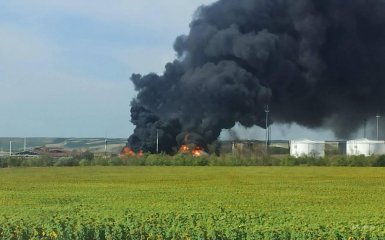The fire at the oil depot in the Rostov region, which supplies fuel to the Russian military, continues on August 31. The refinery was attacked by drones as part of the operation of the GUR of the Ministry of Defense and the SSO, which was carried out by the Ukrainian special services on August 28.
Points of attention
- The Atlas oil plant has been burning for four days, fuel tanks are on fire.
- Russian firefighters are unable to contain the fire.
- Local Telegram channels are circulating videos showing open flames and thick black smoke.
The "Atlas" oil base in the Rostov region has been burning for the fourth day
Photos and videos of the fire at the Atlas oil refinery are being distributed in local media. The facility has been burning for the fourth day.
As of 15:00 on August 31, a powerful fire near Kamensko-Shakhtynsk near Rostov continues. Videos that have been shared show flames and thick black smoke.
Depressurized reservoirs continue the wards. Black toxic smoke is billowing and rising upwards.
Atlas refinery was attacked by drones for the second time in a month. During the strike on August 3, a fire also broke out, but it was quickly contained.
Attack of Ukrainian drones on an oil depot in the Rostov region
In the evening of August 28, Ukrainian special services drones attacked an oil depot near Rostov. Local residents heard a powerful explosion, after which a fire started due to depressurization of the tank.
200 rescuers and special equipment were involved in localizing the fire. However, they have not been able to cope with the consequences of the attack for four days.
A few hours after the first explosion, the second one sounded - another tank was depressurized. According to Russian media, three tanks were on fire.
The fire is confirmed by satellite images of the NASA FIRMS system.
The General Staff of the Armed Forces confirmed the destruction of the Atlas oil depot and another refinery in the Kirov region.








